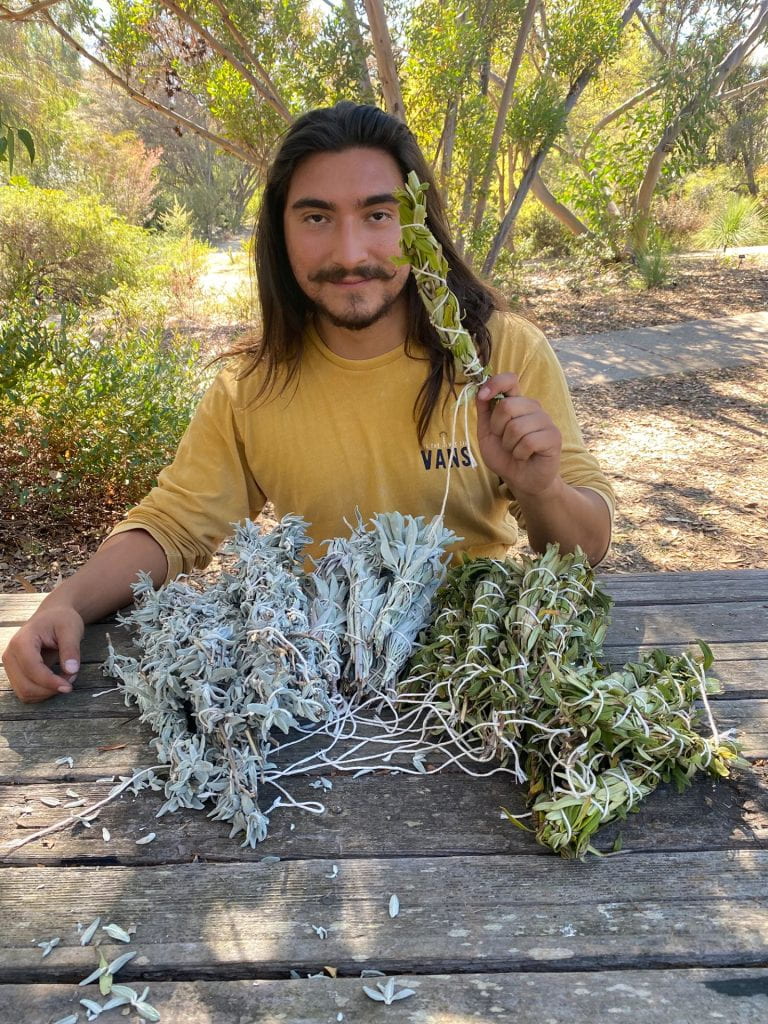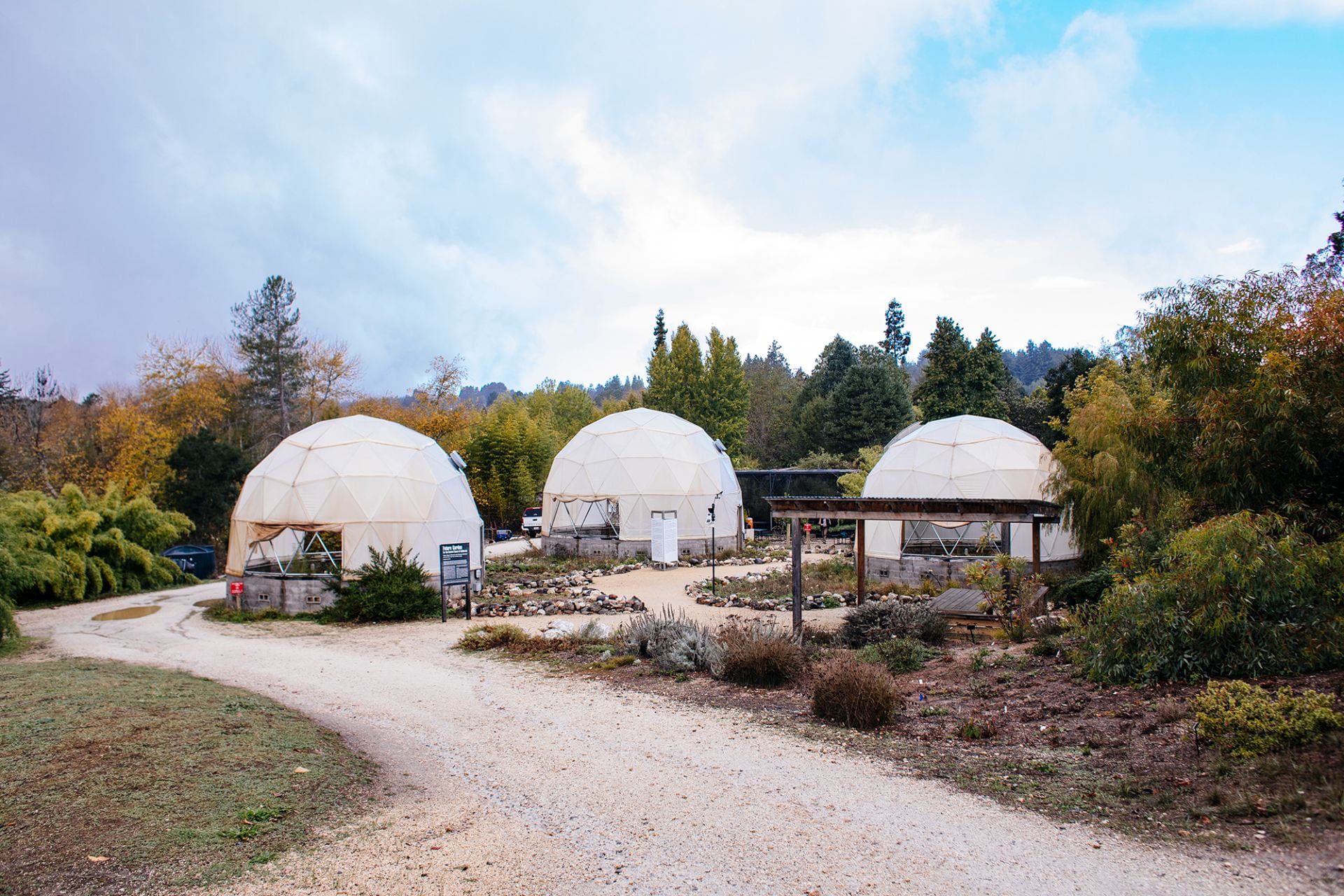
Climate Change, Sustainability and Resilience
Committee members
Elida Erickson, Sustainability Director, co-chair
Sikina Jinnah, Professor of Environmental Studies, co-chair
Claudie Beaulieu, Associate Professor, Ocean Sciences
Rowena Bush, Undergraduate student representative
Maya Caminada, UCSC Climate Coalition student representative
Yihsu Chen, Professor, Electrical and Computer Engineering
Anne Criss, Assistant Dean and Chief of Staff, Baskin School of Engineering
Gage Dayton, Administrative Director, Natural Reserve System
James Doucett-Battle, Associate Professor, Sociology
Robin Dunkin, Acting Faculty Director, Center for Innovations in Teaching and Learning
Rick Flores, Associate Director, Arboretum
Dave Gordon, Assistant Professor, Politics
Galina Hale, Professor, Economics
Kristy Kroeker, Professor, Ecology & Evolutionary Biology
Michael Loik, Professor, Environmental Studies
Flora Lu, Provost, Colleges Nine and John R. Lewis, Professor of Environmental Studies
Kyle Parry, Associate Professor, History of Art/Visual Culture
Renya Ramirez, Professor, Anthropology
Bruno Sanso, Professor, Statistics
Felicity Schaeffer, Professor, Feminist Studies
Bhavyaa Sharma, Ph.D. Candidate in Economics
Oxo Slayer, Senior Physical Planner
Andy Szasz, UCSC Climate Coalition faculty representative
Patrick Testoni, Campus Energy Manager
Jonathan Weidman, Associate Director, Transportation & Parking Services
Darryl Wong, Executive Director, Center for Agroecology
Zac Zimmer, Associate Professor of Literature
Staff support
Zach Dove, Ph.D. Candidate in Politics
Derek Martin, Sustainability Programs Manager
Committee Charge
Urgently addressing climate change requires multidisciplinary research-driven collaboration and collective action centered around climate justice. The committee recommended opportunities for faculty, staff, and students to discuss how the campus should approach climate change, sustainability, and resilience through our teaching, research, and campus operations over the next decade by:
- Identifying ways that UCSC can create and sustain a campus climate and culture that reduces environmental impacts while centering culturally relevant and inclusive sustainability, advancing climate justice, empowering students, and engaging local communities/ partners, including Indigenous communities.
- Proposing undergraduate and graduate student learning opportunities, including curricular and extracurricular pathways (e.g., general education, experiential learning opportunities in natural and built environments, capstone projects, certificate programs, minors, or majors) by which all students would have an opportunity to learn about climate change science and policy, climate justice, resilience, and inclusive sustainability.
- Identifying emerging or new collaborative interdisciplinary research areas related to climate change, climate justice, resilience, and/or inclusive sustainability that advance UCSC’s mission and research leadership position.
- Recommending high-level strategies to evaluate and reduce the environmental impacts of meeting the university’s mission on our campus and the local community. This includes strategies to reduce greenhouse gas emissions (e.g., transportation, energy usage, renewable energy, and electrification infrastructure), increase sustainable food and procurement, reduce resource consumption and waste, responsibly steward water and natural and cultivated lands, and more.
- Recommending strategies to improve climate resilience on campus, including strategies related to fire safety, drought, climate anxiety, economic losses, and climate justice.
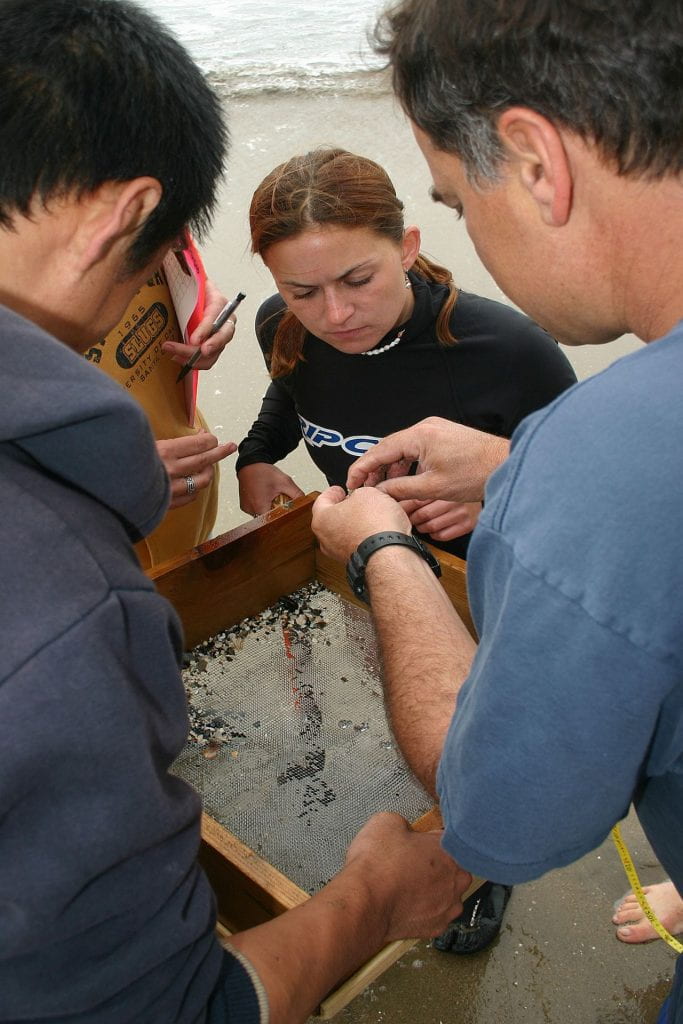
Goals
Goal 1: Build communities of care
Build communities of care, resilience, and preparedness in the face of climate change.
UC Santa Cruz will empower faculty, staff, and students with the tools and resources to prepare for a changing world. The growing presence of climate anxiety on campus and ongoing social and ecological challenges is adding yet another burden to the already daunting task of tackling climate change and environmental injustices worldwide. Enhancing awareness and institutional and individual preparedness regarding emergency planning and training efforts in relation to wildfire, drought, and flooding is critical. Being cared for, educated, and prepared will empower UCSC community members to serve more effectively in their important roles as teachers, researchers, staff members, administrators, and students.
Increasing the availability of mental health resources and physical spaces dedicated to self-care at UCSC will be essential. Climate anxiety is not relegated only to environmentally minded community members. Reaching all those on campus who experience climate anxiety will require a diverse set of culturally relevant approaches and collaboration with offices and units not traditionally associated with sustainability, climate change, and resilience, such as Counseling and Psychological Services.
At UCSC, we are uniquely positioned through our curricular and co-curricular programming to educate on climate change and resilience, and we can further build upon those strengths and increase the availability of operational resources to achieve this goal. Active engagement with climate solutions is essential to empowering our students, staff, and faculty while highlighting the significant work already underway and the challenges the university faces in climate adaptation.
In addition to making a curricular commitment to students, strategies to achieve this goal will include enhancing existing and building new educational resources through the myriad of cross-divisional co-curricular programs, departments, and colleges across campus, including numerous research and teaching centers, and campus organizations such as the People of Color Sustainability Collective, the Sustainability Office, Center for Agroecology, Arboretum, Natural Reserve System, Operations, and Staff Advisory Board.
It is equally important that UCSC advances justice-centered and equitable approaches to its sustainable operations, services, and programs if we are to effectively build diverse and meaningful communities of care. UCSC will increase the availability and optimize the distribution of resources to support access to safe, sustainable, and equitable campus housing. Additionally, our campus will center social justice and Indigenous knowledge practices in its approaches to sustainability and resilience policies and programs.
Finally, it will be crucial to engage and partner with local and regional climate change and resiliency efforts to exchange information, better understand regional climate challenges, and create a forum for potential collaboration on solutions. The campus will also communicate transparently to a broad audience about its progress in advancing the strategic plan goals for Climate Change, Resilience, and Sustainability. UCSC will maintain effective technological tools and utilize modern, culturally relevant communication channels on a predictable, ongoing basis to communicate key performance metrics and progress on goals.
Metrics
- Complete an updated operational five-year Sustainability & Climate Action Plan by the end of fiscal year 2024 to modify existing and set new specific benchmarks and track progress on, but not limited to, the following priority topics:
- Incorporation of climate awareness and sustainability into onboarding materials for all campus newcomers (students, staff, faculty)
- Annual implementation of and progress on sustainability policy measures that center diversity, equity, inclusion, and justice within sustainable operations
- Funding and availability of new and ongoing mental health and educational resources in response to increasing climate anxiety
- Implementation of new and ongoing emergency preparedness and resilience measures and other co-curricular educational programs in the face of climate change
- Increase in availability and accessibility of safe, sustainable, and affordable housing
- Coordinate transparent reporting annually on metrics for all identified priority areas through the terms of the Sustainability & Climate Action Plan and Campus Strategic Plan beginning in fiscal year 2025.
Goal 2: Decarbonize UC Santa Cruz
UCSC to build an equitable, accessible, and fossil-free future. UCSC must address its own role in contributing to greenhouse gas emissions to comprehensively combat climate change. The associated health issues, extreme weather disasters, loss of land and homes, and economic consequences of climate change impact under-resourced communities and people of color first and worst. This issue also hits home for many students, faculty, and staff who come to UCSC from a wide array of personal backgrounds and diverse communities across the globe. Becoming fossil-free in the long term will significantly reduce the university’s contributions to the environmental injustices associated with burning fossil fuels worldwide. These efforts will include increasing the pace of energy efficiency measures, adopting renewable energy sources, installing electrical vehicle charging infrastructure, rolling out an all-electric bus fleet, reducing reliance on vehicles, and ultimately working toward ending the campus’s consumption of fossil fuels.
The university must achieve this goal while simultaneously strengthening power resilience to maintain the integrity of academic research, teaching, and safety in the face of increasingly frequent power outages as the campus grows to educate and house more students. UCSC will explore technologies and innovations to increase power resilience, such as developing micro-grids, installing battery storage, and more. Decarbonization also presents another opportunity for innovative research and for students to practically apply classroom knowledge in the field by using the campus as a living-learning laboratory and encouraging interdisciplinary innovation in the campus’s day-to-day operations.
Uncertainty regarding the effective deployment of new technologies and ways of doing business on this scale will inevitably arise as the campus overhauls infrastructure, processes, and practices that have been in place for several decades. The campus’s electrical service infrastructure will require significant upgrades to accommodate the electrification of all campus energy use, the electrification of the bus and vehicle fleet, and providing more EV charging for personal vehicles. The campus will also implement best practices in change management and employ an intentional workforce development approach focused on the principles of a just transition. To support these myriad efforts, the university will take advantage of the increasing funding opportunities, grants, and state and national incentives focused on advancing decarbonization and electrification.
Metrics
- Complete an updated operational five-year Sustainability & Climate Action Plan by the end of fiscal year 2024 to modify existing and set new specific benchmarks and track progress on, but not limited to, the following priority topics:
- Annual Scope 1 and Scope 2 GHG emissions reductions to 90% over time in alignment with UC systemwide “Pathways to Fossil-Free UC” goals
- Share of equipment and vehicles converted from fossil fuels to electric or hybrid, including the transition from reliance on natural gas fuel sources at the campus cogeneration plant
- Megawatts (MW) of solar and other renewable energy sources installed
- Annual funding and implementation of energy efficiency measures
- The carbon footprint of campus electricity sources (i.e., electricity from utility, natural gas/biogas, and renewables)
- Track Scope 3 GHG emissions (including waste disposal and commuter emissions). Increase accessible, equitable, and zero or ultra-low emissions transportation options and reduce single-occupancy vehicle trips.
- Coordinate transparent reporting annually on metrics for all identified priority areas through the terms of the Sustainability & Climate Action Plan and Campus Strategic Plan beginning in fiscal year 2025.
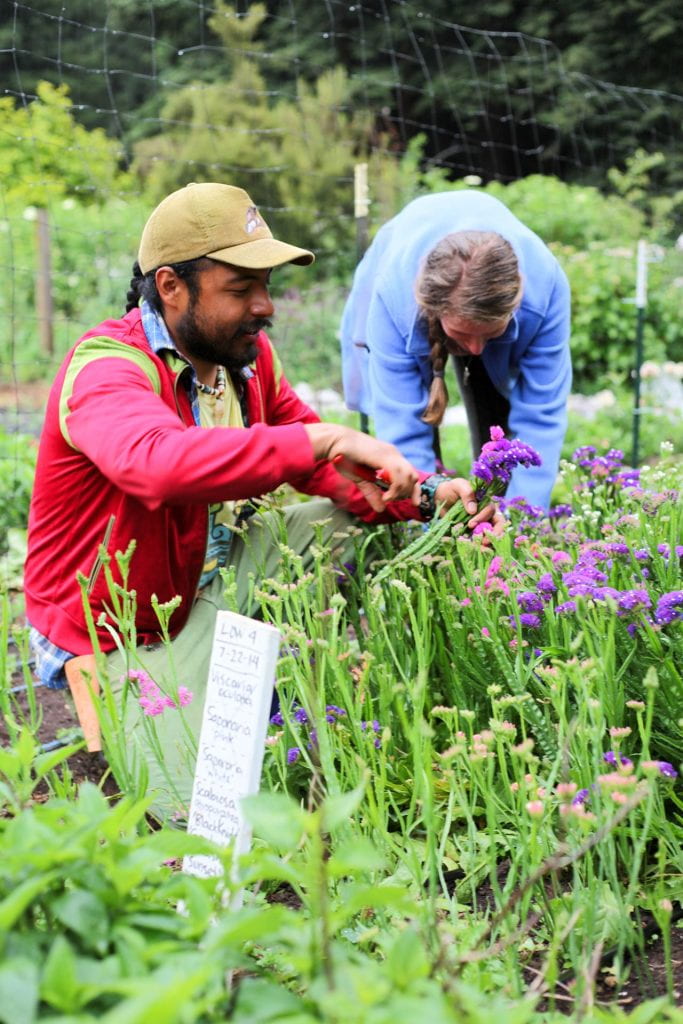
Goal 3: Steward the water and land
Steward the water and land to support healthy social and environmental ecosystems.
UCSC is situated in a unique location, with spectacular vistas of the ocean at the intersection of many different habitats, including redwood forest and open meadows, natural and built lands, multiple watershed drainages, and limestone karst topography. This exceptional environment has offered opportunities to build bridges between teaching, research, and operations while promoting land stewardship and supporting student learning by leveraging the campus as a living laboratory, most notably through programs and courses at the Center for Agroecology, the Arboretum, and the Campus Natural Reserves. UCSC will expand upon the existing work with the Amah Mutsun Tribal Band on campus, such as at the Arboretum, to increase Indigenous engagement, including working with the Amah Mutsun Tribal Band to provide land access, provide cultural expertise support on projects, and to help steward ecosystems with traditional ecological practices.
Effective stewardship at UCSC will involve a variety of strategies to support biodiversity and preserve habitats while simultaneously increasing housing and enhancing accessible, safe circulation pathways for active transportation and Americans with Disabilities Act (ADA) needs and supporting sustainable and accessible transportation options such as walking, biking, and mass transit. Additionally, increasing charging stations for electric vehicles and bus fleets will be essential as the campus continues to grow. A comprehensive Habitat Conservation Plan for the Residential (Main) Campus and Westside Research Park will include a conservation strategy for endangered and threatened species, and a Wildfire Vegetation Management Plan will enhance UCSC’s climate resilience. Additionally, Indigenous knowledge practices, traditional ecological management practices, cultural preservation of known archaeological sites, and dedicated land access for the Amah Mutsun will be essential to merging environmental justice practices with existing sustainable land stewardship practices at UCSC.
Increasing temperatures and long-term drought necessitate that UCSC continues to serve as a leader in best practices in water management. In the decade ahead, water conservation measures will be ongoing, including the reduction of irrigation for ornamental landscaping. The campus will explore potential non-potable and recycled water sources to reduce reliance on treated drinking water from the City of Santa Cruz for various irrigation applications, including growing food and maintaining landscapes. Non-potable water options for the campus to explore through the Non-Potable Water Master Plan include groundwater, gray and black water treatment facilities, and dual water infrastructure systems to pipe graywater for toilet flushing and landscaping.
Metrics
- Complete an updated operational five-year Sustainability & Climate Action Plan by the end of fiscal year 2024 to modify existing and set new specific benchmarks and track progress on, but not limited to, the following priority topics:
- Land management to protect biodiversity and ecosystem conservation, including living laboratory opportunities
- Sustainable build-out of campus, including additional affordable housing
- Physical infrastructure for a diverse array of multi-modal transportation options to create an accessible and inviting sustainable transportation culture
- Water systems that adapt to uncertain water conditions, including non-potable water systems
- Annual water usage and implementation of water conservation and efficiency measures
- Coordinate transparent reporting annually on metrics for all identified priority areas through the terms of the Sustainability & Climate Action Plan and Campus Strategic Plan beginning in fiscal year 2025.
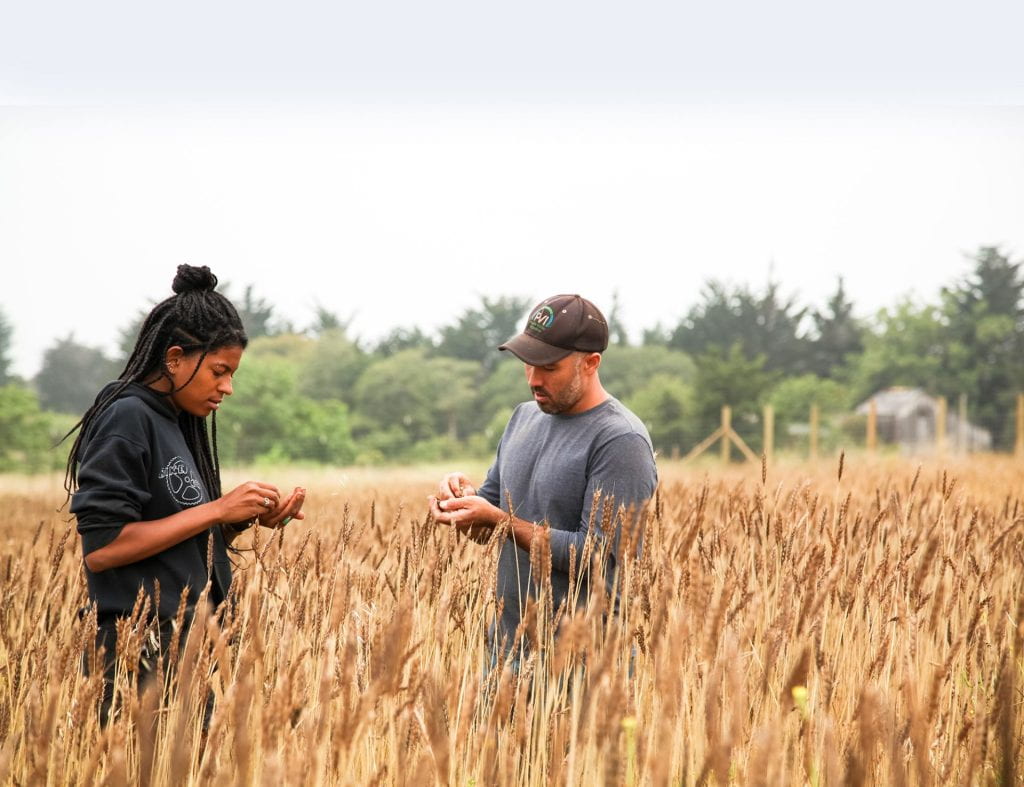
Goal 4: Advance a circular economy
Advance a circular economy in the consumption cycle.
The Environmental Protection Agency (2022) defines a circular economy as one that reduces material use; redesigns materials, products, and services to be less resource intensive; and recaptures “waste” as a resource to manufacture new materials and products. The purchase, consumption, and disposal of goods on campus enable the university to meet its important teaching and research mission but also directly contribute to the environmental footprint of UCSC.
The consumption life cycle begins with procurement, which presents an opportunity to use UCSC’s spending power to influence our vendors. Choosing companies that integrate environmental, social, and governance (ESG) principles into their operations; that are small, local, and/or diverse businesses; and that sell products that are transparent about their supply chain and its related environmental and social impacts will enable UCSC to use its financial resources to support sustainability-minded companies. The Central Coast region has a myriad of small-scale, minoritized growers practicing organic climate-smart agricultural practices. UCSC’s operational commitment to these local producers will support the campus’s regional standing, continue to position UCSC as a leader in sustainable and socially aligned food purchasing, and further support recruitment and retention efforts in the south Santa Cruz County area.
Following the acquisition of products, how they are consumed can reduce UCSC’s environmental footprint. This includes buying energy- or water-efficient equipment and purchasing products that come in minimal packaging. Extending the useful life of products through reuse and refurbishment can reduce the need to purchase new items, thus reducing resource use. Creating a campus ecosystem that supports reuse is essential. This includes maximizing capacity for reusing a wide variety of items, such as the creation of donation spaces, supporting an effective campus surplus operation, installing additional water bottle filling stations, and making utility sinks in residence halls easily accessible to enable proper cleaning of reusable eating ware.
A consistent, accessible, and convenient waste system for items at the end of their useful lives will provide campus users with a simple process to dispose of the most common waste items. This requires zero-waste stations (recycling, compost, and landfill) with effective signage sized appropriately for the space and prominent for campus users to locate. Specifically, UCSC must increase the number of compost bins across all areas of campus to match landfill and recycling bin availability.
Not only is waste a resource and a land use issue, but waste is also a climate change issue, as waste disposal creates greenhouse gases. For example, organic waste that enters a landfill decomposes to generate methane gas, a significantly more potent greenhouse gas than carbon dioxide. Tracking waste and progress to meeting the UC’s waste goals will contribute to a more comprehensive accounting of UCSC’s Scope 3 emissions.
Significant education and outreach tailored to various groups of campus users are needed to meet UCSC’s waste goals. This will not only educate the campus about how to sort waste properly, but also reduce the amount of waste generated by focusing on intentional purchasing and using resources such as Campus Surplus to reuse items and CruzBuy to facilitate and track sustainable spending.
Metrics
- Complete an updated operational five-year Sustainability & Climate Action Plan by the end of fiscal year 2024 to modify existing and set new specific benchmarks and track progress on, but not limited to, the following priority topics:
- Harness the spending power of the university to support sustainable and diverse businesses
- Source food that is plant-based and meets the Real Food Calculator definition of sustainable food, and/or from vendors who are building a resilient food system in the face of climate change
- Develop infrastructure that supports a culture of reuse and reusables to reduce single-use items consumed by campus users
- Create tools, processes, and practices that enable reuse, refurbishment, and sharing of university-owned resources
- Meet UCSC’s waste reduction (50% reduction by 2030) and diversion goals (90% diversion) by increasing consistency of zero-waste stations, increasing compost bin availability, and education and outreach
- Coordinate transparent reporting annually on metrics for all identified priority areas through the terms of the Sustainability & Climate Action Plan and Campus Strategic Plan beginning in fiscal year 2025.
Goal 5: Teach students about climate change
Ensure that all students graduate with a transdisciplinary understanding of climate change grounded in justice, experiential learning, and diverse approaches to knowledge.
UCSC must ensure that all students graduate with an understanding of climate change that is transdisciplinary, epistemologically diverse, and rooted in climate justice and experiential learning. This education must also enable students to critically evaluate whether certain responses and solutions are effective, equitable, and sufficient. Building on our existing strengths in climate science, pursuing this goal will position UCSC to lead the nation in preparing the next generation of innovative and equity-minded leaders in climate response across all workforce sectors. Epistemologically diverse approaches are critical in training the next generation of climate leaders. It demands both strengthening and indigenizing UCSC’s climate education and learning opportunities to ensure that students understand scientific ways of knowing and artistic, humanistic, and justice-centered approaches to understanding and responding to climate change. Centrally, this training must also include Indigenous ways of knowing and Indigenous climate justice, emphasizing how harms resulting from historical and structural processes related to settler colonialism must be addressed to effectively and equitably tackle climate change. Experiential learning is central to this approach.
UCSC should develop a required basic curriculum that exposes all undergraduate students to climate change and climate justice. The curriculum should be designed via a bottom-up process, co-designed with deep collaboration from all five divisions, the Colleges, the Senate, the Teaching and Learning Center, and staff and student representatives through a task force created for this purpose. We urge against a model that loosely knits together professors from various disciplines in diverse but unconnected guest lectures. Instead, we encourage the CP/EVC to provide course development resources that would compensate faculty and lecturers across all five divisions and the colleges to co-develop learning outcomes and content collaboratively.
Recognizing that careful curriculum development takes time and community engagement, and also the urgency of climate change, while the new curriculum is being developed, all incoming first-year students should be required to take one existing course related to climate change and/or climate justice (to be identified by the task force). We encourage departments (with populous majors) to add at least one climate-related course to their major requirements. In addition, degree programs should provide students with opportunities to dive deeper into climate change from multiple perspectives, including creating new interdisciplinary majors and minors, new climate-related tracks or courses within existing majors, or new certificate programs. Finally, experiential programming that centers on climate justice could be integrated beyond coursework through summer internship experiences and Summer Bridge programs.
At the graduate level, students should have access to training and information on how their discipline relates to climate change and on climate-related career pathways for their particular degree. A regular cross-campus speaker series on climate change and access to a centralized resource that connects faculty in different disciplines with climate change themes in their research would support this goal. To strengthen and diversify graduate student research on climate justice and resilience, the Cota-Robles Fellowship program should be expanded to include two additional fellowships for climate justice and resilience-focused graduate students. There may also be opportunities to engage with UCSC alumni working in climate justice and climate change–related fields. Graduate students as academic student employees should also be provided with consistent pedagogical training on climate and experiential learning.
Metrics
- Establish a task force to inventory existing climate courses by fall 2023, make recommendations to the Chancellor by spring 2024, and secure Senate approval by spring 2025 on a basic climate curriculum to be launched in fall 2025.
- Ensure that the task force plans for regularly updating and making accessible a list of courses with climate content by fall 2023.
- Create, fund, and launch a new center dedicated to research and teaching climate justice (see Research Goal #1) as soon as possible.
- Produce incentives for departments and colleges to develop programs to deepen climate education on campus as soon as possible.
- Generate and fund opportunities to recognize and support student-led learning, including peer-to-peer education, co-curricular programming, student-facilitated experiential learning courses, and community engagement.
- Hire 10 more Professors of Practice and/or Teaching Professors with diverse expertise in climate change and climate justice within the next 5 to 10 years.
- Expand the Cota-Robles Fellowship program to include two additional fellowships for climate justice and resilience-focused graduate students by winter 2024.
- Create an interdisciplinary climate and experiential learning–focused pedagogical training available to all graduate students.
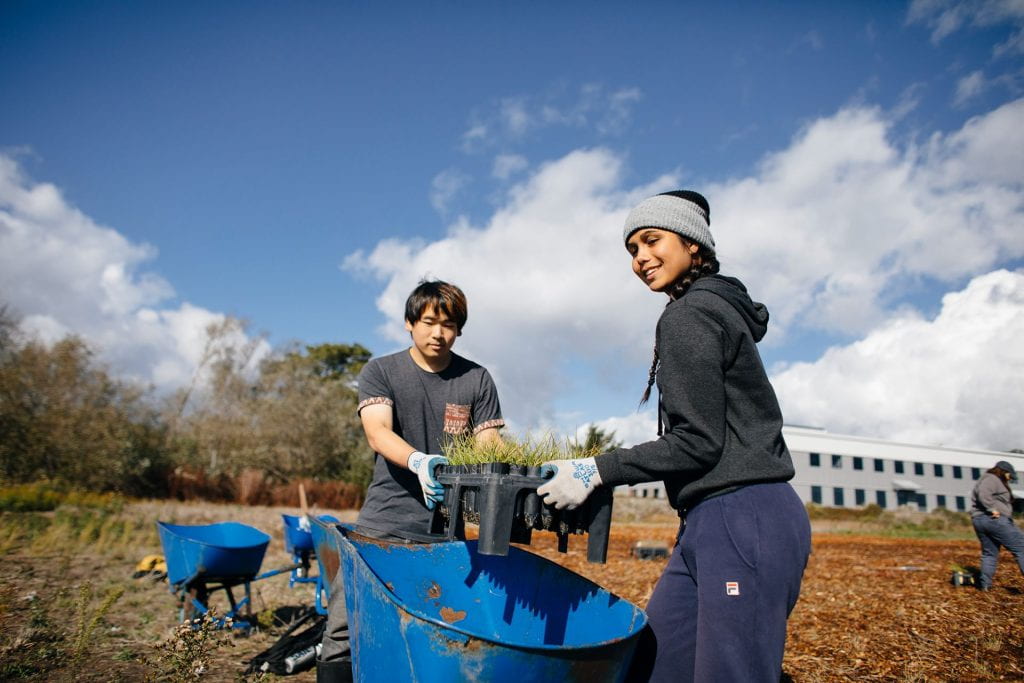
Goal 6: Advance sustainability and climate change research
Expand, value, and incentivize collaborative, solution-oriented, justice-centered, and diverse research approaches to climate change and sustainability.
UCSC should incentivize interdisciplinary and transdisciplinary collaborations. In recognizing and valuing diverse approaches to knowledge, UCSC will be positioned as a global leader in understanding the interactions between physical drivers and biological impacts with climate change’s social, political, and justice dimensions. This necessary shift is gaining interest and support across policy, academia, the private sector, the arts, and the public.
UCSC should identify and make visible the myriad climate-related instructors, courses, research activities, artistic projects, programs, and ways of knowing that exist across campus. A crucial first step is expanding existing efforts to map faculty research across the divisions; this will involve working toward a database and accessible online search tool. Augmenting this digital infrastructure with physical spaces and regular community-building events that connect diverse researchers, artists, students, community partners, and others offers an exciting opportunity to actively encourage novel collaborative relationships and research projects. Regular community building programs should be supported by dedicated staff and be designed and hosted in collaboration with all five divisions, with co-sponsorship by one or more centers/institutes across campus.
UCSC must also transform institutional incentives to encourage and reward diverse forms of collaboration in climate change, sustainability, and resilience-related research. For all its proven value in fostering original, solutions-oriented research, collaboration does not always find supportive conditions, especially in some fields where individualized research and creative practice are more highly rewarded. Collaborative and justice-oriented research entails a necessary level of intellectual and professional risk and requires time and energy. Potential responses to these barriers include course releases, seed funding, and a task force led by the Campus Provost and Executive Vice Chancellor and the Vice Provost for Academic Affairs, and including members of the Senate Committee on Academic Personnel (CAP) on amending merit review criteria to reward such work. UCSC should also enhance and expand administrative support structures for transdisciplinary grant writing and management.
Collaborative and diverse, solutions-oriented research can also be enhanced by building on and expanding existing structures for community-engaged research and partnerships. UCSC should leverage existing expertise on campus to develop training resources in community-engaged research, including for STEM researchers; create mechanisms for participant compensation; and set aside project development funding to enable UCSC researchers to engage community partners meaningfully. UCSC should also create a residential activist and community scholar program.
Incentivizing community-based and epistemologically diverse research will also help UCSC to ameliorate harms resulting from knowledge production’s extractive nature. Climate research and action that advances justice, and does not reinforce injustice, is predicated on eliminating these harms. UCSC should ensure that its research provides multiple forms of benefits to research participants and partners, thereby enhancing UCSC’s relations with its community partners. This includes engaging in reciprocity agreements with research participants to ensure that their community needs are met. This could be catalyzed through discussion and training on research ethics and diverse approaches to climate research.
A newly funded Center for Climate Justice, with focal areas in, among others, Indigenous climate justice and climate resilience, would play a pivotal role in celebrating and rewarding the diversity in research that is necessary to address climate change effectively. It would further place UCSC at the forefront of innovative and impactful social justice–oriented research on climate change, sustainability, and resilience. The new center must have a structure, staff composition, and mission tailored to advancing climate justice. This would require the Center for Climate Justice to be established as a new entity separate from the Center for Coastal Climate Resilience, which has a different mission. However, the two centers may collaborate to maximize their impact.
The campus community identified several other strategies that should also be considered to achieve this goal. These include altering UCSC’s divisional structure by creating a School of the Environment; leveraging the new Center for Coastal Climate Resilience to spearhead research collaboration; reinstating positions for Professors of Practice across divisions and disciplines, including in climate justice, Indigenous studies, and climate science; expanding faculty expertise related to climate justice, for example by conducting an interdisciplinary cluster hire focused on climate justice; and incentivizing graduate student-faculty research collaboration and mentorship by creating new GSR positions, particularly in underfunded divisions.
Metrics
- Create, populate, and provide sustained staff support for a publicly accessible clearinghouse of climate, sustainability, and resilience-related teaching, research, and graduate students, faculty, and programs by the end of 2025.
- Establish, fund, and staff a new Center for Climate Justice and conduct a Target of Excellence faculty hire to lead the new center by spring 2024.
- Inventory existing and develop a plan to expand extramural funding that supports collaborative, justice-centered, solution-oriented, or diverse research approaches to climate change and sustainability.
- Develop training resources and structured opportunities to enable more faculty and students to participate in community-engaged research within two years, including by hiring five Teaching Professors and/or Professors of Practice with expertise in community engagement.
- Conduct a review of policy and administrative barriers to community-engaged scholarship and residential visiting programs for activists within one year.
- Track and raise funds for regular community-building events to enable informal and formalized interactions among diverse climate scholars and foster collaborative relationships. This may include a new physical space, the creative adaptation of underutilized spaces, and incentives to encourage participation.
- Hire 10 new research faculty across divisions with climate justice, sustainability, and resilience expertise within five years.
- Immediately scale up programming to incentivize and reward transdisciplinary, collaborative work.
Goal 7: Forge relationships with Indigenous communities
With an ethos of reciprocity and respect, forge relationships with Indigenous peoples/organizations that enable the co-production of knowledge and action plans toward climate justice.
Mainstream approaches to climate change response have focused on greening our economy and technological responses that merely reproduce the social problems that make climate change such an intractable problem to solve without addressing ongoing and historical causes of harm. “Colonialism is not a historical event, but an ongoing set of relations that still characterize the common sense of professional science” (Liboiron, 2021). Such colonial relations are seen in the mundane workings of the university, manifesting the assumed universal superiority of Western ways of knowing and doing. For generations, research has benefited from and taken access to Indigenous lands, lives, and knowledge for granted. As scientists and scholars, we have inherited these practices and worldviews that have dismissed Indigenous science and ways of knowing as insufficient; that presume the right to collect, extract, control, and display items taken from Indigenous lands and bodies without consent (ProPublica, 2023), including within the UC system (Hudetz et al., 2023); and that erase Indigenous relationships to land and non-human relatives through practices such as colonial place names. To address these forms of harm, UCSC must signal its commitment to Indigenous science to begin a reversal of the erasure of Indigenous peoples’ culture and history. This is a commitment toward more just land relations and confronting the dominant knowledge paradigm that presumes entitlement to Indigenous land, life, and knowledge (Liboiron, 2021).
As we state in our land acknowledgement, UC Santa Cruz sits on “the unceded territory of the Awaswas-speaking Uypi tribe. The Amah Mutsun Tribal Band, comprised of the descendants of Indigenous people taken to missions Santa Cruz and San Juan Bautista during the Spanish colonization of the Central Coast, is today working hard to restore traditional stewardship practices on these lands and heal from historical trauma.” This statement speaks not only of the genocide of Indigenous peoples, but also of their survivance and continued commitment to sustain biocultural care in recognition of the co-evolved relationships of humans and non-human kin.
Faced with climate disruption, the power and potential of Indigenous ecological stewardship is increasingly recognized for its critical role in protecting the environment (Anderson, 2005; Cuthrell, 2013; Keeley, 2002). Indigenous knowledge systems that address climate change are situated in the dynamic intersections between land and sovereignty; the natural environment (including humans); institutions; technology (e.g., from GIS to tools to make birch bark canoes); economics (i.e., systems and interactions that prioritize collective well-being); and human perception, activity, and behavior. These approaches demonstrate a multiplicity of ways to care for the planet. Honoring and incorporating this conceptual, ideological, cultural, and linguistic diversity opens the possibility for more heterogeneous, nuanced, and contextualized efforts toward place-based, justice-centered sustainabilities and would reflect yet another way UC Santa Cruz exemplifies innovation and social equity.
Centering and elevating these approaches also aligns with UCSC’s commitment to student success. Integrating interdisciplinary and transdisciplinary ways of knowing, including Indigenous science, is essential to training the leaders and change-makers of tomorrow.
Metrics
- Adopt a formal agreement between UCSC and the Amah Mutsun Tribal Band that lays out commitments for collaboration, sharing of space/information/resources, and consultation by fall 2023.
- Engage and create Cultural Conservation Easements that provide access to traditional lands for Amah Mutsun Tribal Band stewardship.
- In close consultation with the Indigenous Faculty Network (IFN), conduct a Target of Excellence hire for a senior faculty member with expertise in California Indigenous Studies, including Indigenous climate justice, resilience, and/or ecological knowledge.
- Undertake a cluster hire for new research faculty focusing on local ecological knowledge in Indigenous studies in the next three years.
- Strengthen scholarship in California Indigenous Studies, including Indigenous climate justice and resilience, through, for example, a cluster hire, departmental status for Indigenous Studies, and/or a new Center for Indigenous Studies.
- Increase curricular content across campus to increase the visibility of Indigenous scholars and culture, through, for example, a cluster hire, departmental status for Indigenous Studies, and/or a new Center for Indigenous Studies.
- Create a focal area on Indigenous climate justice within the proposed new Center for Climate Justice by spring 2024.
- Increase support for IFN engagement on all of these issues.
